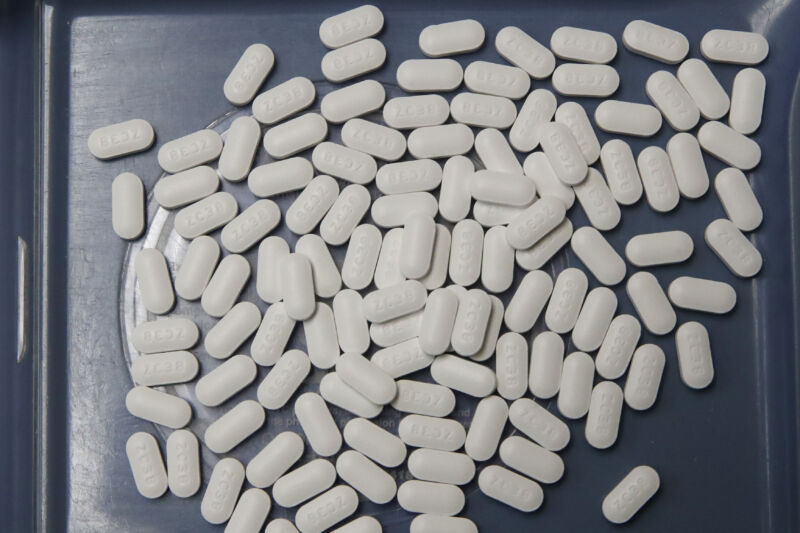Ditched drug —
All the data is pointing to the popular anti-malaria drug having no effect.
Beth Mole
–



Enlarge / Pills of Hydroxychloroquine sit on a tray at Rock Canyon Pharmacy in Provo, Utah, on May 20, 2020.
The World Health Organization on Wednesday announced that it is abandoning use of the anti-malaria drug hydroxychloroquine in the Solidarity trial—the organization’s massive, global clinical trial of potential COVID-19 treatments.
The WHO cited early data from the trial and others showing that hydroxychloroquine does not lower the risk of death or provide any other clinical benefit in hospitalized patients.
“Investigators will not randomize further patients to hydroxychloroquine in the Solidarity trial,” the WHO said in a statement. “Patients who have already started hydroxychloroquine but who have not yet finished their course in the trial may complete their course or stop at the discretion of the supervising physician.”
The decision comes just two days after the US Food and Drug Administration revoked its Emergency Use Authorization for hydroxychloroquine and the related drug chloroquine. The EUA had allowed doctors in the United States to prescribe the drugs for treatment of COVID-19 patients outside of clinical trials.
Like the WHO, the FDA made its decision to revoke the EUA based on early trial data that showed “no evidence of benefit for mortality or other outcomes such as hospital length of stay or need for mechanical ventilation.”
One of the main sources of that data is the Recovery Trial, a large, randomized trial in the UK run by researchers at the University of Oxford. On June 5, the lead investigators of the trial announced they were halting the use of hydroxychloroquine after reviewing early data.
“A total of 1,542 patients were randomized to hydroxychloroquine and compared with 3,132 patients randomized to usual care alone,” they reported. “There was no significant difference in the primary endpoint of 28-day mortality (25.7% hydroxychloroquine vs. 23.5% usual care; hazard ratio 1.11 [95% confidence interval 0.98-1.26]; p=0.10). There was also no evidence of beneficial effects on hospital stay duration or other outcomes.
“These data convincingly rule out any meaningful mortality benefit of hydroxychloroquine in patients hospitalized with COVID-19,” they concluded.
Promising start
Hydroxychloroquine—which is approved for use against malaria and autoimmune diseases such as lupus and rheumatoid arthritis—appeared to have some anti-viral activity in early laboratory testing. It’s also thought to have immune-modulating affects, which have been hypothesized to be helpful in treating severe cases of COVID-19. But evidence to support its use in the coronavirus pandemic has always been thin; early trials produced mixed and inconclusive findings of effectiveness against COVID-19.
Still, the drug rose to prominence and became politicized after being repeatedly touted by US President Donald Trump, who called it a “game changer” and even told reporters that he was taking it as a prophylactic.
Muddling the issue, a high-profile study in The Lancet reported that not only was hydroxychloroquine ineffective, it increased rates of death and heart-rhythm complications in hospitalized COVID-19 patients. Though heart-rhythm complications are a known risk of hydroxychloroquine, the findings were determined to be based on a dubious dataset from an equally dubious data analytics company. The study has been retracted.
But, with data from reputable studies coming out, it’s becoming clearer that hydroxychloroquine is, unfortunately, not effective at treating COVID-19.
Other trials are still ongoing to assess whether it could prevent an infection with the new coronavirus, SARS-CoV-2. The WHO noted in its announcement today’s decision to end hydroxycloroquine’s use in the Solidarity trial, which looks at stopping COVID-19, “does not apply to the use or evaluation of hydroxychloroquine in pre- or post-exposure prophylaxis in patients exposed to COVID-19.”
However, results from those trials are not looking good either. One recently published study involving 821 people who had been in close contact with someone with COVID-19 found taking hydroxychloroquine after exposure did not prevent people from becoming ill. According to Science magazine, a Spanish study on post-exposure prophylaxis involving 2,300 people also found no benefit of hydroxychloroquine.
The WHO’s Solidarity trial will carry on with the other potential treatments for COVID-19, which include the HIV treatment lopinavir-ritonavir, remdesivir, and interferon beta-1a. The Solidarity trial is enrolling thousands of COVID-19 patients in over 400 hospitals in 35 counties.

